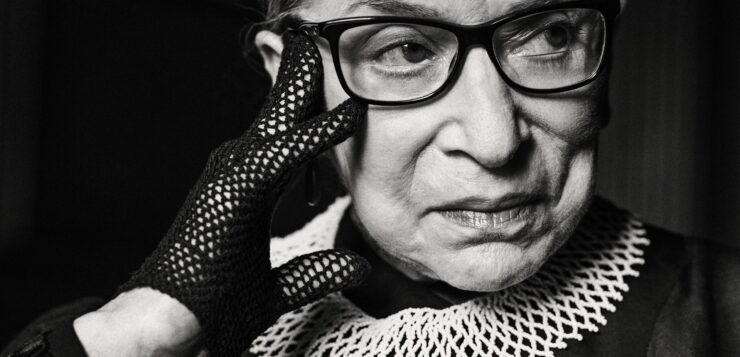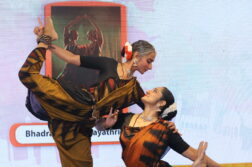The Judge
Ruth Bader Ginsberg was an extraordinary person on multiple counts. Judged by any standard, her character, conduct and conviction were so out of ordinary and so distinctly unorthodox that they elicited unqualified appreciation, even adoration, often grudgingly, at times reluctantly but never insincerely.
She was not only the second woman judge to serve on the US Supreme Court, she was also synonymous with the struggle and advocacy of women’s equal rights. She was outspoken to a fault, her voice and views resonating far and wide with an impact unparalleled in the US judiciary but also that lingered long enough to leave a permanent imprint. She is known more for her dissenting judgments that created as much impact if not more as the majority view did; and whose words – courageous, convincing, often caustic but never casual, left behind a legacy that lasted much beyond the contemporary context.
She engendered a culture, a cult, one that was followed passionately and loyally. And she was fiercely independent and intrepid. In US Supreme Court’s tradition, the dissenting judge will record, ‘I respectfully dissent’; Ginsberg will record, ‘I dissent’, signifying the salience and substance of dissent and underlying its equality with the majority view. The term ‘respectfully’, she termed as avoidably disingenuous, a nicety and embellishment eminently insincere.
Born on Ides of March 1933 in Brooklyn, New York, she was appointed a Judge of the United States Court of Appeals for the District of Columbia Circuit in 1980 at the age of 47. President Clinton nominated her as an Associate Justice of the Supreme Court, and she took her seat on August 10, 1993, and continued till her death on September 18, 2020.
On the Court, Ginsburg became known for her active interventions and avid participation at the time of oral arguments. She also became famous for wearing jabots, or collars, with her judicial robes. She used them to convey a message, a symbolic one. Curiously she wore both a majority-opinion collar and a dissent collar.
The way women are?
Early in her tenure on the Court, Ginsburg writing the majority opinion in United States Vs. Virginia (1996) observed, “generalizations about ‘the way women are,’ estimates of what is appropriate for most women, no longer justify denying opportunity to women whose talent and capacity place them outside the average description,” She held that the men-only admission policy of a state-run university, the Virginia Military Institute (VMI), violated the equal protection clause. Rejecting VMI’s contention that its program of military-focused education was unsuitable for women, Ginsburg noted that the program was in fact unsuitable for the vast majority of Virginia college students regardless of gender. This was a judgment that foretold the tenor and spirit of slew of outstanding pronouncements that were to follow in a large number of cases that would create judicial history.
Ginsburg, however, attracted greater attention for several strongly worded dissenting opinions and publicly read some of her dissents from the bench to emphasize the purport of dissent. In the 2007 Gonzales v. Carhart case, which upheld the federal Partial-Birth Abortion Ban Act on a 5–4 vote, Ginsburg decried the judgment as “alarming,” arguing that it “cannot be understood as anything other than an effort to chip away at a right [the right of women to choose to have an abortion]declared again and again by this Court.” The same year, in Ledbetter v. Goodyear Tire, another 5–4 decision, Ginsburg criticized the majority’s holding that a woman could not bring a federal civil suit against her employer for having paid her less than it had paid men. Ginsburg argued that the majority’s reasoning was inconsistent with the will of the U.S. Congress —a view that was somewhat vindicated when Congress passed the Lilly Ledbetter Fair Pay Act of 2009, the first bill that Democratic U.S. President Barack Obama signed into law.
Dissent for perspective
The number of landmark dissents, representing the liberal perspective on many prominent and politically charged matters, won her admirers both passionate and reluctant but more than that they established her intellectual perspicacity and clear-sightedness. What she authored ensured that the legal debate on a variety of issues remained open on an unaddressed moral dimension and that the matter was far from concluded. And while the majority may have settled the law, for the time being, its questioning was possible, palpable and prominent. In Shelby County V. Holder (2013), the Court’s conservative majority struck down as unconstitutional, Section 4 of the Voting Rights Act (VRA) of 1965, which had required certain states and local jurisdictions to obtain prior approval – “preclearance” from the federal Justice Department of any proposed changes to voting laws or procedures. Ginsburg, in dissent, criticized the “hubris” of the majority’s “demolition of the VRA” and declared that “throwing out preclearance when it has worked and is continuing to work to stop discriminatory changes is like throwing away your umbrella in a rainstorm because you are not getting wet.”
If her conviction was unflinching, her articulation of it was unequivocal, sharp and even reprimanding. In Burwell v. Hobby Lobby Stores, Inc. (2014), Ginsburg wrote that the majority opinion “falters at each step of its analysis” and expressed concern that the Court had “ventured into a minefield” by holding “that commercial enterprise…can opt-out of any law (saving only tax laws) they judge incompatible with their sincerely held religious beliefs.” Prior to this in 2012, in the Affordable Care Act cases that posed a constitutional challenge to the Patient Protection and Affordable Care Act (also known as “Obamacare”), she criticized her five conservative colleagues for concluding—in her view contrary to decades of judicial precedent—that the commerce clause did not empower Congress to require most Americans to obtain health insurance or pay a fine. It was a partial dissent.
Multi-dimensional
That she was a brilliant judge, was established beyond doubt but the brightness of her intellect and comprehension had shown right from the days of her upbringing and education. She tied for the first place for her law degree from Columbia Law School and was also the first woman to be on the editorial board of the Law magazine when she attended the Harvard Law School. She did her clerkship with Edmund L. Palmieri, Judge of the United States District Court for the Southern District of New York, from 1959–1961. She was a Professor of Law at Rutgers University School of Law from 1963–1972, and Columbia Law School from 1972–1980, and a fellow at the Centre for Advanced Study in the Behavioural Sciences in Stanford, California from 1977–1978.
In 1971, she co-founded the Women’s Rights Project of the American Civil Liberties Union, and served as the ACLU’s General Counsel from 1973–1980, and on the National Board of Directors from 1974–1980. She served on the Board and Executive Committee of the American Bar Foundation from 1979-1989, on the Board of Editors of the American Bar Association Journal from 1972-1978, and on the Council of the American Law Institute from 1978-1993.
A feminist
Her strong beliefs and unshakable conviction about equality of sexes and getting women their rightful place in harnessing the opportunities of life coupled with her fearless articulation of them made her a feminist folk hero. In part because of her increasing outspokenness, Ginsburg became, during the Obama administration (2009–17), a progressive and feminist folk hero. Inspired by some of her dissents, a second-year law student at New York University created a Tumblr blog entitled “Notorious R.B.G.”—a play on “Notorious B.I.G.,” the stage name of the American rapper Christopher Wallace—which became a popular nickname for Ginsburg among her admirers.
Part of this conviction arose from her own experiences of discrimination and inequity meted out to her early in her life. What affected her the most was the refusal of a Supreme Court Justice to accept her as a clerk because she was a woman despite having the most outstanding credentials. Her frequent encounters with the societal sense of fairness and equity, invariably biased and loaded against women, filled her with a steely resolve to face, oppose and transform it. This resolve and determination continued till the last, in fact, became stronger and vociferous increasingly with the passage of time.
Late in her term in the Supreme Court, some liberals, citing Ginsburg’s advanced age and concerns about her health (she was twice a cancer survivor) and apparent frailty, argued that she should retire in order to allow Obama to nominate a liberal replacement. Others, however, pointed to her vigorous exercise routine and the fact that she had never missed an oral argument to urge that she should remain on the Court for as long as possible. For her own part, Ginsburg expressed her intention to continue for as long as she was able to perform her job “full steam.” On the day after Martin Ginsburg died in 2010, she went to work at the Court as usual because, she said, it was what he would have wanted.
She never shied away from opening her convictions on her sleeves, often to the detriment of her public image. In an interview in 2016, Ginsburg expressed dismay at the possibility that Republican candidate Donald Trump would be elected president—a statement that was widely criticized as not in keeping with the Court’s tradition of staying out of politics. (Ginsburg later said that she regretted the remark.) Trump’s electoral victory renewed criticism of Ginsburg for not having retired while Obama was president. She remained on the Court as its oldest justice, publicly mindful of John Paul Stevens’s service until the age of 90.
Her life was marked by a clarity of purpose unequalled in intensity and richness. She did not learn the art and craft of conceit, nor practised it, nor even entertained it. The transparency and integrity of her convictions were infectious, endearingly and perhaps her greatest strength.
Views are personal. The author was the former Information and Broadcasting Secretary, GOI. Mr Uday Kumar Varma serves as an esteemed jury member on the SABERA The Social and Business Enterprise Responsible Awards 2021 Jury Board.
Postscript
Varma shares “Writing about Judges has always been difficult, some may even find it odious. The inscrutability of their lives and their overly sensitive reaction to anything unpalatable or controversial makes the task a bit more challenging if not altogether daunting. But it may change soon. Ginsberg was, however, an exception in many ways. Her life and her philosophy were so transparent and her uncommon capacity to practise what she preached was so rare, that they made her loved, adored and respected, even when one disagreed with some of the things she believed in and the manner in which she articulated them. But she never minced words nor did shy away from wearing her convictions and ideologies on her sleeves. Her honesty in adhering to her beliefs was legendary and an inspiration to judges of today and tomorrow. She fought effectively and combatively for women’s rights and opportunities and will be long remembered for her landmark judgments setting precedents in the judicial arena. But above all, her unflinching commitment to her convictions and the unusually exceptional courage to articulate them will be commemorated for a long time to come.”
Women have often been neglected as major contributors to the history of the world either through commission or distortion. It’s a delight for us to have taken on the challenge to unearth these overlooked gems and keep relevant the stories of amazing women in history.
This article is part of a series on women in history who have excelled in their area of passion. You may also like to read about the activist Emmeline Pankhurst from England, the lady sniper Lyudmila Pavlichenko, the American Amelia Earhart pilot or just maybe a piece on Frida Kahlo?





